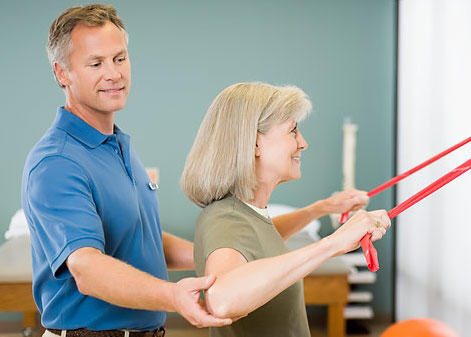Advanced Care for Joints and Bones
You live a busy, active life, but issues with your joints and bones may be slowing you down. Residents of Amarillo and the surrounding area can take advantage of the full range of orthopedic services offered at Northwest Texas Healthcare System.
Our orthopedic surgeons use advanced techniques and technology to diagnose and treat injuries and disorders involving joints, bones, muscles, ligaments and tendons, such as knee ligament injuries, osteoarthritis, carpal tunnel syndrome, and fractures. We can get you closer to the normal range of motion you once enjoyed and back to the active, independent lifestyle you desire.
Schedule an Appointment
Visit Northwest Physicians Group to find a physician and schedule an appointment, or call 806-398-3627.
Services
Northwest Texas Healthcare System offers a full range of surgical and nonsurgical treatments for orthopedic problems.
Total Hip Replacement
During a total hip replacement, the diseased or damaged cartilage and bone of the hip joint are surgically replaced with artificial materials. Total hip replacements are most commonly performed because of progressively severe arthritis, the most common being degenerative arthritis (osteoarthritis) of the hip joint. This type of arthritis generally occurs because of aging, a congenital abnormality of the hip joint or prior trauma to the hip joint. Other conditions that can lead to total hip replacement include bony fractures of the hip joint and necrosis (death) of the hip bone. Necrosis can be caused by a fracture of the hip, drugs (such as alcohol or corticosteroids), diseases (such as systemic lupus erythematosus) or kidney transplantation.
If you are experiencing progressively intense chronic pain, together with impairment of daily functions that include walking, climbing stairs and rising from a sitting position, you may want to consider a total hip replacement. Replacement generally is considered only after pain becomes so severe that it impedes normal function despite use of anti-inflammatory medications. A total hip joint replacement is an elective procedure, which means that it is an option selected among other alternatives.
Total Knee Replacement
A total knee replacement is generally performed when a person has a severe degenerative joint disorder, such as osteoarthritis, in which the moving surfaces of the knee deteriorate. This leads to severe pain, limitation or loss of function, and/or deformity of the joint. Surgery may also be performed to replace a badly fractured knee, or when previous joint replacements have failed. Bilateral replacement means that both knees are replaced at the same time.
Other treatments are commonly used before total knee replacement. They include:
- Acetaminophen or anti-inflammatory drugs if the joint has degenerated
- A procedure called synovectomy, which is surgical removal of inflamed synovial tissue, the tissue that lubricates moving parts of a joint
- Osteotomy, which is restructuring of the bones to shift stresses from diseased tissue to more healthy tissue
Total Shoulder Replacement
Total shoulder replacement is less common than knee or hip replacement surgery. It is often used to treat severe fractures, as well as other painful shoulder conditions, including:
- Osteoarthritis (degenerative joint disease)
- Rheumatoid arthritis
- Post-traumatic arthritis
- Rotator cuff tear arthropathy, which is a combination of a non-reparable tear of the rotator cuff tendon and severe arthritis
- Avascular necrosis, or osteonecrosis
There are several types of shoulder replacement surgery, with most replacing the patient's shoulder joint with a polished metal ball and plastic socket. In some cases, only the ball is replaced and the patient's existing bone socket is retained. Different types of replacement joints may be used, depending on the patient's condition. Other treatments are commonly used prior to considering shoulder replacement surgery. They include rest, exercise, physical therapy, and medications to help control arthritis pain.
Hand, Shoulder and Elbow Surgery
Orthopedic services offered at Northwest include the diagnosis and treatment of acute and chronic problems of the hand, shoulder, and upper extremity, including:
- Work-related and other traumatic injuries
- Arthritis (rheumatoid and degenerative)
- Carpal tunnel syndrome
- Congenital hand injuries and deformities
- Upper extremity pain problems
- Rotator cuff disorder
- Arthritis (replacement surgery)
- Fractures, dislocations, instability
Foot and Ankle Surgery
Specialists at Northwest diagnose and treat problems of the foot and ankle, with an emphasis on adult reconstruction and revision surgery. We treat traumatic and post-traumatic problems, and congenital and developmental disease and deformities, including:
- Forefoot abnormalities, deformities, or painful conditions (bunions, hammertoe)
- Mid-foot and hind foot deformities (congenital, developmental or arthritic)
- Tendon and ligament problems (traumatic or degenerative)
- Diabetic foot disorders
- Ankle fractures, arthritis, instability, deformities
- Non-united fractures
- Traumatic, developmental or congenital deformities
Sports Medicine
At Northwest Sports and Ortho, we take a modern approach to help you get back to what you love to do. Our team offers outpatient physical therapy (PT) to athletes of all ages and levels.
Learn More About Sports Medicine
Traumatic Orthopedic Injuries
We help patients recover from orthopedic trauma and post-traumatic complications through surgery and pain management. Special emphasis is placed on the team approach to care and to surgical management of complex orthopedic trauma as well as post traumatic reconstruction, including:
- Complex open and closed fractures and dislocations
- Blunt and penetrating bone, joint, muscle and tendon injuries
- Nonunions, malunions and infections

Orthopedic Rehabilitation
We offer comprehensive rehabilitation services for people with orthopedic injuries and other conditions that require rehabilitation.
